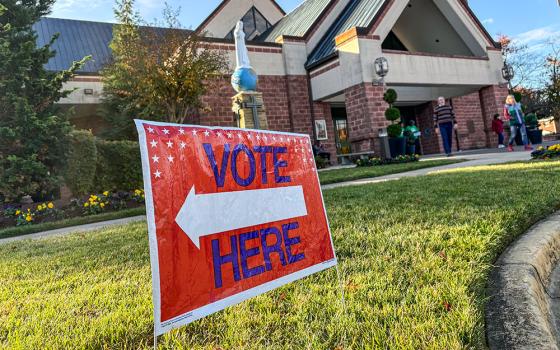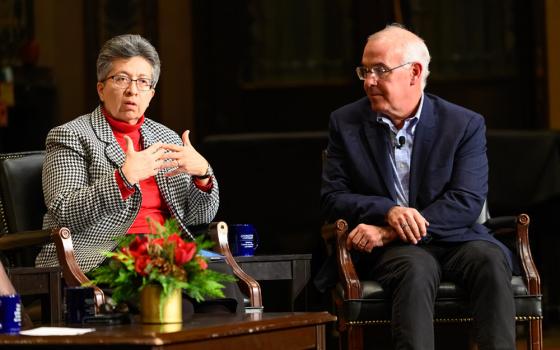
Mexican migrant Juan Pablo Vazquez, 55, who worked as a welder in Los Angeles, and was deported to Mexico, prays as he celebrates the traditional Thanksgiving with a meal offered by deported migrant Esther Morales at her restaurant, in Tijuana, Mexico, Nov. 28, 2024. (OSV News/Aimee Melo, Reuters)
President-elect Donald Trump's plans to launch a mass deportation program could crash the economy by increasing inflation and unemployment and undermine trust in the U.S. military, some witnesses said at a Senate hearing Dec. 10.
The hearing by the Senate Judiciary Committee examined the potential impact of mass deportations on the U.S., as it is one of the hardline immigration policies Trump campaigned on. Since his election, Trump has also indicated his willingness to involve the military in the domestic effort.
While Trump has not yet offered specifics on how he would carry out such a program, mass deportations more broadly run contrary to the Second Vatican Council's teaching in "Gaudium et Spes" condemning "deportation" among other actions, such as abortion, that "poison human society" and are "supreme dishonor to the Creator," a teaching St. John Paul II affirmed in two encyclicals on moral truth and life issues.
During the (at times) tense hearing, Republicans on the Senate Judiciary Committee argued that Trump's election to a second term shows that U.S. voters are concerned about border security. Democrats on the panel argued that broad deportations, rather than tailoring those efforts to those who have committed violent crimes, would result in a slew of negative economic and social outcomes for the U.S.
Senate Majority Whip Dick Durbin, D-Ill., chair of the Senate Judiciary Committee, said in remarks at the hearing that while he hopes "we can all agree that any undocumented immigrant found guilty of a serious crime should not be allowed to stay here," mass deportations would weaken the military and "cost hundreds of billions of dollars to deport every undocumented immigrant in our country."
"It would damage our economy and separate American families," he said. "Instead, we should focus on deporting those who are truly a danger to America, and we should give the rest a chance to earn legal status. They would have to register with the government, certainly pay their taxes, and submit to serious background checks. Most Americans — nearly two out of three — agree we should give lawful status to undocumented immigrants who don't pose a threat to our country."
Sen. Lindsey Graham, R-S.C., ranking member of the Senate Judiciary Committee, argued at the hearing that Durbin's "focus is misplaced here."
"You should want mass deportations of people here illegally that represent threats to our country," he said.
"So if you're here illegally, get ready to leave," he added. "If you're a criminal, we're coming after you first."
Aaron Reichlin-Melnick, a senior fellow at the nonpartisan American Immigration Council, argued at the hearing, "A mass deportation campaign would be a costly mistake for American taxpayers."
Advertisement
"When we account for the enormous capital investment, infrastructure and hiring necessary to arrest, detain, process and remove 1 million people per year, we estimate that mass deportations would cost $968 billion in total, enough to instead construct 2.9 million new homes or fund Head Start for 79 years," Reichlin-Melnick said, referring to a program that invests in early childhood education and health programs for low-income families.
A mass deportation program, he further argued, would shrink the economy by expelling those who are both producers and consumers.
"Prices would rise in sectors with significant undocumented workforces: building, maintaining and repairing," Reichlin-Melnick said. "Houses would become more expensive, as would groceries, restaurants, travel and childcare. Every American would feel the pinch of inflation. Overall, we estimate that a mass deportation campaign would lead to a loss in total GDP of 4.2 to 6.8% at minimum, as much as the Great Recession, and just like then, many Americans would lose their jobs; even an attempt to support millions of people will have repercussions."
But Patty Morin, whose daughter Rachel Morin was found raped and killed in 2023 in a case where the alleged perpetrator had previously been deported three times, argued a deportation program would increase public safety.
"At this very moment, I think deportation is necessary," she said, adding, "The American people should not feel afraid to live in their own homes."
"We need to follow the laws that are already on the books; we need to close our borders," Morin argued. "We need to protect American families."
Some senators on the committee sparred with the witnesses, at times bringing up witnesses' social media posts or asking if they supported "open borders." But there were signs of potential areas of compromise. Some Democrats signaled support for the argument that those with a criminal record should be deported.
Sen. Amy Klobuchar, D-Minn., said she watched Trump's Dec. 8 interview with NBC News, arguing, "He really challenged us on the Democratic side to work with him when it came to the Dreamers," or those impacted under the Deferred Action for Childhood Arrivals program. Known as DACA, it offers some protection from deportation to certain immigrants brought to the country as children without legal authorization.
"I want to be able to work something out," Trump said in that interview.
Klobuchar said, "I accept the challenge."







